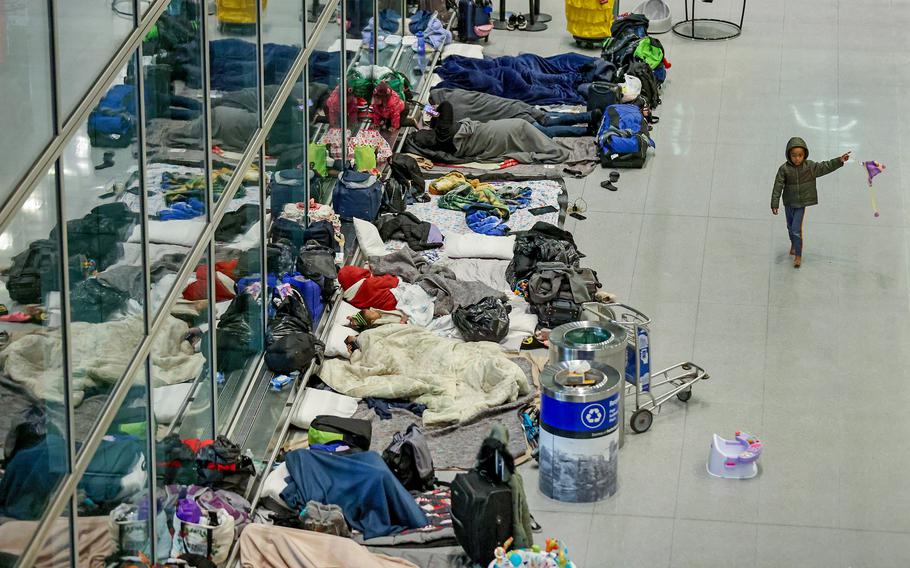
Migrants spend the night on the floor in January at Logan Airport in Boston. Spending on the Massachusetts emergency shelter system topped $700 million as of June, according to a new report. (Matt Stone/Boston Herald/TNS)
BOSTON (Tribune News Service) — Massachusetts spending on the emergency shelter system housing migrant families and local residents has crossed the $700 million threshold, according to data released Monday.
Government budget writers have projected the state will shell out approximately $932 million on the emergency shelter system in fiscal year 2024 and another $915 million in fiscal year 2025, which began on Monday. The massive costs were spurred by an influx of migrants over the past year.
Gov. Maura Healey’s finance and housing offices said the state had spent $715 million on the emergency shelter program as of June 27, though the figure is largely representative of costs through mid-March.
“March invoices are currently being received and processed,” the report said.
As migrants arrived in droves to Massachusetts, the state turned to a network of hotels and motels to increase state-run shelter capacity for families with children and pregnant women. Housing people in those locations can often prove costly, sometimes running $300 a night.
Healey over the past year has approved restrictions on the shelter system, including a nine-month time limit on families’ stay, a 7,500 family cap, a monthly requirement for people in overflow sites to reapply for services, and just last week a prohibition on sleeping overnight at Logan Airport.
At an unrelated event in Lowell Tuesday, Healey said while the state is required to provide families with children and pregnant women with shelter, there is only so much room.
“It’s why I took action this fall to announce the cap and to establish a waiver,” she told reporters. “My position has been, we simply cannot shoulder this. It’s why I also demanded time and time again that Congress step up and act and provide relief to the state.”
Boston, Worcester, Springfield, and Lynn are playing host to the most families in shelters, hotels, and motels of the 351 cities and towns in Massachusetts, according to the report.
About $210 million, or one third of the total money spent, has been paid to shelter providers who run traditional locations as well as the hotels, motels, and overflow sites, according to the report.
Another $24 million has gone to municipalities to help alleviate costs associated with an increased number of students from shelters, the report said. The state has also spent $2.7 million for “additional educational supports” like student transportation and multilingual faculty.
After Healey put a capacity limit on the emergency shelter system, those who applied for services were directed to overflow sites, including at state-owned facilities in Lexington, Roxbury, Chelsea, Cambridge, and Norfolk.
The locations were oftentimes unsuited to house families immediately and the state had to spend money to upgrade the sites. The report released Monday shows officials have spent $1.1 million to make “life safety improvements” at overflow sites.
There were 7,463 families in the emergency shelter system, another 417 at overflow sites, and 699 on the waitlist for placement as of June 27, according to state data and the report.
A separate report released Monday provides an update on an effort to move 400 migrant families out of state-run shelters and into stable housing by the end of the year.
Healey and the state’s eight resettlement agencies inked $10.5 million worth of contracts to stand up the program, which takes a well-known resettlement strategy used at the federal level with humanitarian parolees from Afghanistan and Ukraine and applies it to those in local emergency shelters.
Ascentria Care Alliance committed to helping 75 families in the Worcester and Greater Springfield area move into long-term housing and is expected to receive $1.5 million to do so, the most of the eight organizations, according to the report.
Five other groups contracted to help 50 families and are in line to receive $1 million while Jewish Family Service of Metrowest agreed to assist 25 families and is expected to receive $500,000 to do so, the report said.
©2024 MediaNews Group, Inc.
Visit at bostonherald.com
Distributed by Tribune Content Agency, LLC.